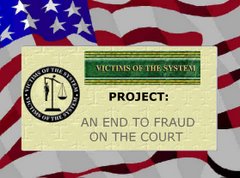Judges impose secrecy on ethics-rules revision
FEDERAL COURTS
http://www.miamiherald.com/news/nation/story/285048.html
Judges impose secrecy on ethics-rules revision
Secrecy on the rewriting of federal misconduct rules is only deepening suspicions among critics who say judges have failed to police themselves adequately.
Posted on Fri, Oct. 26, 2007
By MARISA TAYLOR
mtaylor@mcclatchydc.com
WASHINGTON --
Judiciary Committee, calling a mistake the decision to keep rule-change comments secret.
As the federal judiciary embarks on a historic revision of its rules against judicial misconduct, the panel of judges that is overseeing the drafting of new regulations refuses to disclose the public comments that could help shape the overhaul.
After requesting public comments about the proposed rules, the Committee on Judicial Conduct and Disability refuses to say how many responses it received, who commented or what was said.
''I have never heard of public comments being made confidentially,'' said Abner Mikva, a retired chief judge of the U.S. Court of Appeals for the District of Columbia Circuit. ``I'm trying to think of an explanation, but this strikes me as very strange.''
What's known is that several chief circuit judges across the country are among those who weighed in, sparking speculation that the judiciary is debating the merits of the proposed rules, which would impose unprecedented oversight over how federal courts handle complaints.
BEHIND CLOSED DOORS
Legal experts said they weren't surprised by the reticence to release the information. By tradition and necessity, the federal judiciary often weighs some of its most important decisions behind closed doors and without public input.
Such secrecy, however, threatens to overshadow what's supposed to be the most sweeping tightening of federal judicial-misconduct policies in a quarter of a century.
Some watchdog groups questioned whether the panel's decision to withhold the comments was intended to prevent the disclosure of details of misconduct or to hide unhappiness among judges about having to comply with new rules.
The proposed rules provide strict oversight from Washington and require judges to leave much more detailed paper trails explaining their decisions about whether to investigate misconduct, experts said.
HABIT OF SECRECY
The judiciary previously has been criticized for imposing secrecy in matters that would more appropriately be discussed openly.
Earlier this year, court officials initially refused to disclose details about the sponsors of expenses-paid trips for judges, as new ethics rules require.
''It shows how difficult it is to wean the judiciary off its habits of confidentiality and keeping things to themselves,'' said Arthur Hellman, a professor who specializes in federal judicial ethics at the University of Pittsburgh School of Law. 'It's so deeply engrained that their first reaction is always, `No, no, that's not for public circulation.' ''
The decision to keep the written responses under wraps comes as the judiciary is under growing pressure from Congress to provide a better public explanation of how it handles misconduct complaints.
Legislators, advocacy groups and legal experts said that withholding the written responses would only add to suspicions about the often-secretive misconduct proceedings.
Rep. James Sensenbrenner of Wisconsin, a Republican member of the House Judiciary Committee, called the decision a mistake.
''By releasing them, the judicial branch would have credibility that it is responding to the failure of its own procedures,'' he said.
The changes come in response to criticism that federal judges have failed to police themselves adequately. Last year, a panel overseen by Supreme Court Justice Stephen Breyer concluded that judges who handled five of 17 high-profile complaints had failed to investigate them properly, although it didn't find the problem to be systemic.
COMPLAINTS REJECTED
In the last five years, the judiciary closed 3,532 complaints but took action against judges in only four cases. In defending the high dismissal rate, judges point out that a large number of misconduct complaints are filed by people who misunderstand or abuse the process. Often, litigants who have lost their cases file misconduct complaints when they should be appealing the decisions to higher courts. Accusations of conflict of interest also are generally handled separately in recusal requests.
But critics said they thought that the judiciary might be failing to punish some judges either because the threshold for misconduct was too low or because matters weren't being investigated thoroughly.
Sensenbrenner and Republican Sen. Charles Grassley of Iowa have proposed legislation to create an inspector general's office that would independently investigate allegations of judicial misconduct. The judiciary opposes the idea, which Grassley said demonstrated that some judges ``see themselves like gods who are above criticism.''
INCOMPLETE DETAILS
Pittsburgh's Hellman praised the new rules but told the committee that they don't go far enough in requiring details about complaints.
In several cases, circuit courts have provided few details or written vague opinions about judges who are punished for misconduct. In September, the 5th U.S. Circuit Court of Appeals reprimanded U.S. District Judge Samuel B. Kent in Galveston, Texas, but didn't specify his punishment or detail what he did wrong. Publicly, at least one female court employee has accused him of sexual harassment.

2 comments:
жесткое порно галереи бесплатно
порно видео бесплатно старухи
женские попки года
воткинск секс
детские порно видео
эротический рассказ сиськи
фото секс ретро
сиски памэлы андерсон
волгоградский секс
частное порно фото ню
Lovely blog yyou have here
Post a Comment